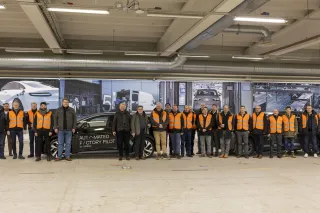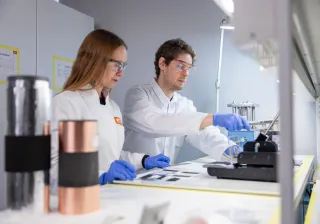What do the future leaders of the energy industry, equipment manufacturers, process engineering enterprises, and transportation companies have in common? Being early movers in the adoption of hydrogen-based technologies. We brought together Nordic experts from different corners of the hydrogen field to discuss how to start building business with hydrogen.
While the hype around hydrogen has been growing for a while, now is the time to turn its potential into business. The companies that get started now, will capture the lion’s share of the hydrogen market, which is estimated to grow into the scale of hundreds of billions in the European Union by 2050. We invited two guests, Per Langer, EVP, City Solutions, Fortum Corporation and Matti Noponen, Director, Technology, Elcogen to discuss hydrogen and business with our own VTT experts Jussi Manninen, EVP, Carbon Neutral Solutions and Antti Arasto, VP, Industrial Energy and Hydrogen.
The time is ripe for hydrogen business
Hydrogen is no longer the future, it is here. And not only is it here to stay, but it is here to grow, says Jussi Manninen. The promise of hydrogen is now on the cusp of starting to show up on companies’ bottom lines, and new businesses, ecosystems and initiatives are popping up around Europe and the world.
Hydrogen is not just here to stay; it is here to grow.
Both Manninen and Antti Arasto agree that there is a lot of business to made in hydrogen, and that the next step is for companies to decide how to be part of the transition. “Fortune favours the brave,” Manninen says. “For many businesses there might not be a second or a third chance. Large companies may have the luxury to buy out someone else’s hydrogen business later on, but for those hoping to join the hydrogen pioneers, the time to make a move is now.”
Per Langer from Fortum agrees. Decarbonisation is a reality that sets new challenges to our societies locally, nationally, regionally and – of course – globally, but it also creates new opportunities for business. “The big question for us as a society is not just the technology, it is a matter of how we build a new system, and how effective it will be.”
This requires a shift in the way the society views energy, sustainability, and people’s role in driving change. In concrete terms, it also requires new infrastructure to support decarbonisation.
Human activities can change the world for better, and we need to allow ourselves to build the solutions.
“Sometimes we stop the development instead of improving the environment when we focus too narrowly on the local impact instead of considering the global impact as a whole,” Langer says.
The critical role of good policy
Businesses have a huge role in driving the transition, but a successful hydrogen revolution sets demands also for policy makers. So, what decisions need to be taken next and what concrete actions need to follow?
“When we discuss what different production solutions we can use, it is like discussing what kind of car we would like to drive. A red one? Maybe blue? How much horsepower? But in reality, the kinds of roads we have to run those cars on, is the important part,” answers Langer.
In addition to an acute need for infrastructure, all of the experts agreed that the society needs courage to form a clear vision about how to enable and support the transition. One big question will be if and how to coordinate efforts and strategies across borders. Do we build a European system? A Nordic system? Or should we focus on the national level?
The commitment from policy makers is a must, because both the resources and the regulation that enable action depend on decisions made at the societal level. The good news is that as with companies, early movers will also be rewarded among societies. This too, however, requires courage.
“We do not have a hydrogen society today, but for that to be a reality in the future, we don’t just need new technologies, but we need to have the courage to start using hydrogen technologies and their applications early," Matti Noponen says.
Opportunities across industries
While many early movers and pioneer companies are taking their first steps and investing in hydrogen, many opportunities for securing first-mover advantage are still up for grabs, and there are opportunities across the value chain for different companies.
For some, hydrogen will be an integral part of the company’s energy revolution, while others may be part of pioneering new hydrogen-based technologies. After all, there is a lot to be done in a business that is striving to replace oil.
Hydrogen is not just for heavy industries, and neither is it for just propeller heads.
Elcogen is an example of a company that is driving the transition by pushing the boundaries of technology. Matti Noponen has spent his career specializing in fuel cells (SOFC and PEM), thermodynamics, multi-physics, and electrochemistry, and is now the director of technology at Elcogen. Elcogen operates at the heart of the technology improving the efficiency and driving the commercialisation of ceramic anode-supported solid oxide cells and stacks. However, Noponen sees the opportunities of hydrogen also in broader terms: “Hydrogen can be used as a feedstock, a fuel, or an energy carrier and storage. It has many applications across industry, transport, power and building sectors.”
In fact, there are opportunities also for companies that do not consider hydrogen their core business.
“Hydrogen can be used to replace fossil fuels in existing installations in heavy industries, like the steel industry or refineries. There are also opportunities in areas like fleet-based mobility applications and of course, entirely hydrogen-based systems and hydrogen economy,” explain Antti Arasto. “And all of that is happening at the same time.”
In addition, there will be a huge demand for exporting knowhow and expertise whether in research, consulting, or engineering. There will also be opportunities in horizontal technologies like control systems or powerlines. Especially in the early stages, the value is not only in products, but also in expertise.
Getting started on the hydrogen journey
When the participants at VTT’s online event were asked to assess their organisation’s interest in hydrogen, over 70 % reported having either a mild interest, a quite strong interest, or a strategic interest towards hydrogen. Only less than 30 % reported already having a clear hydrogen vision. But regardless of the maturity of your company’s hydrogen plans, there are opportunities for those willing to pioneer.
“Locate your own niche in the hydrogen business,” Arasto advises. “There is a need for different kinds of players. (…) No one will cover all the ground; this transition will require many players in different roles.”
Decarbonisation for heavy industries and transportation is of course an important example, but the key is to consider the entire value chain, Antti Arasto explains. “Some hydrogen-based solutions will serve entire industrial plants, while others will fit under the hood of your car.” And each solution will require new technological innovation, hardware manufacturing, carbon-neutral steel to produce the hardware and much more. The industry will also need help in integrating the technology, which creates a demand for experts in project delivery, consulting, and more.
Some hydrogen-based solutions will serve entire industrial plants, while others will fit under the roof of your car.
The most important thing to understand is that a successful transition will be a combination of ambition, technological solutions, skills, ecosystems & networks. A transition of this scale will benefit from cooperation across industries and different skill sets. “Three qualities are required from all: flat hierarchy, resilience, and flexibility,” says Arasto.
If your company’s interest in hydrogen has not yet turned into a roadmap, there is no reason to be left behind. At VTT, we help companies explore the possibilities of hydrogen technology in their operations. We manage a fully automated research infrastructure and combine excellent hardware technology and experimental knowhow about FC&H2 domain to create economically viable and environmentally sustainable solutions.
“We at VTT can be the partner to help you get started on your hydrogen journey and make the most of the hydrogen revolution,” says Jussi Manninen. “The game is on. The winners are being selected now,”





